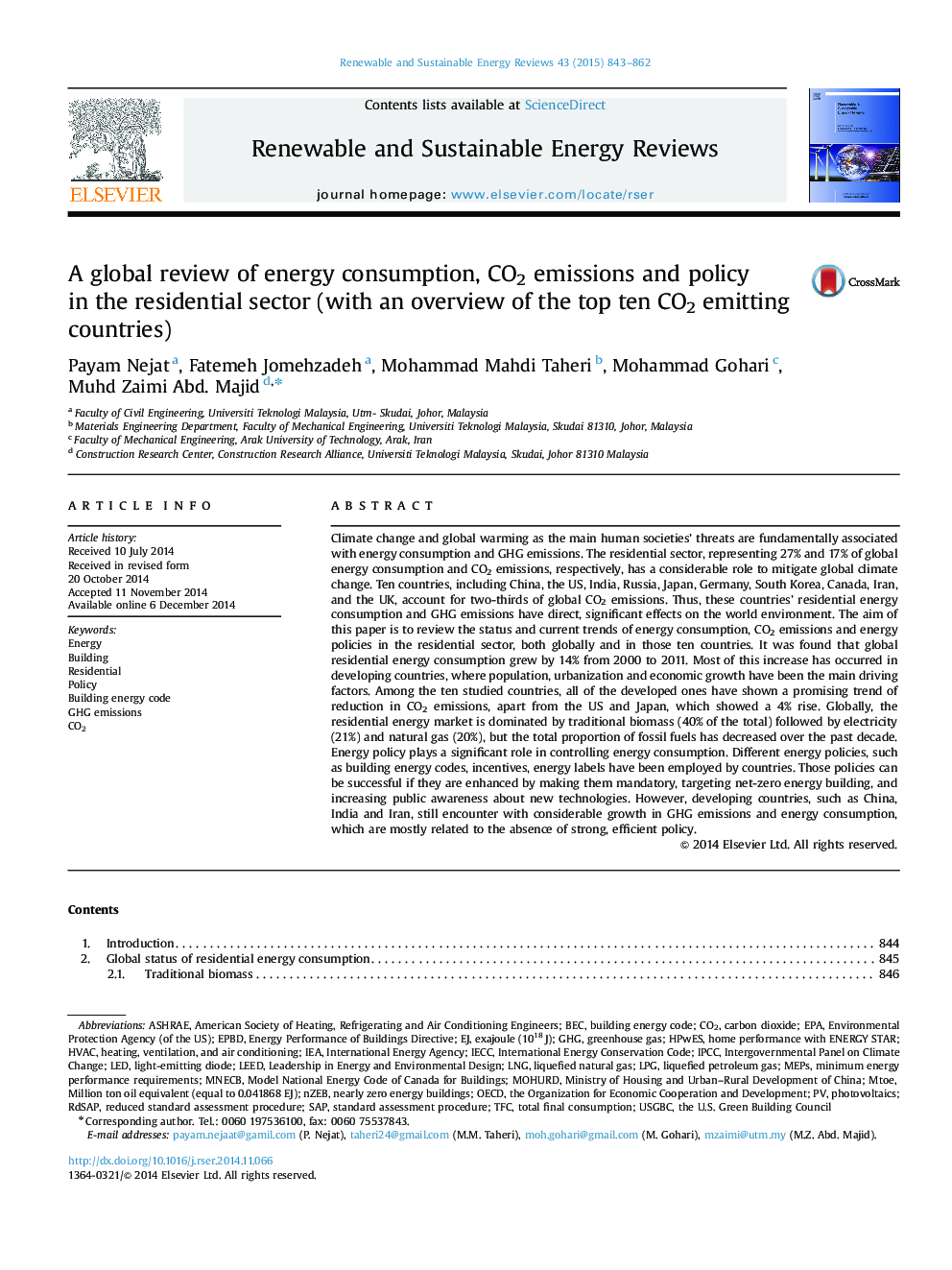| کد مقاله | کد نشریه | سال انتشار | مقاله انگلیسی | نسخه تمام متن |
|---|---|---|---|---|
| 8118005 | 1522342 | 2015 | 20 صفحه PDF | دانلود رایگان |
عنوان انگلیسی مقاله ISI
A global review of energy consumption, CO2 emissions and policy in the residential sector (with an overview of the top ten CO2 emitting countries)
ترجمه فارسی عنوان
بررسی جهانی مصرف انرژی، انتشار گازهای گلخانهای و سیاست در بخش مسکونی (با یک دید کلی از ده کشور برتر دنیا)
دانلود مقاله + سفارش ترجمه
دانلود مقاله ISI انگلیسی
رایگان برای ایرانیان
کلمات کلیدی
OECDIPCCIEAEPAGHGBECASHRAELNGTFCnZEBEPBDLEEDLPGTotal final consumptionMtoestandard assessment procedureInternational energy agency - آژانس انرژی بین المللیGHG emissions - انتشار گازهای گلخانه ایEnergy - انرژیHVAC - تهویه مطبوعPolicy - خط مشی یا سیاستlight-emitting diode - دیود نورافشانCarbon dioxide - دیاکسید کربنLED - رهبریLeadership in Energy and Environmental Design - رهبری در طراحی انرژی و محیط زیستBuilding - ساختمان Nearly zero energy buildings - ساختمانهای نزدیک به صفر انرژیSAP - شیرهEnergy performance of buildings directive - عملکرد انرژی دستورالعمل ساختمانPhotovoltaics - فتوولتاییکMOHURD - محورResidential - مسکونیMEPs - نمایندگان مجلسIntergovernmental Panel on Climate Change - هیات بین دولتی در مورد تغییرات اقلیمیBuilding energy code - کد انرژی ساختمانCO2 - کربن دیاکسیدLiquefied natural gas - گاز طبیعی مایعliquefied petroleum gas - گاز مایع شدهGreenhouse gas - گاز گلخانه ایheating, ventilation, and air conditioning - گرمایش، تهویه و تهویه مطبوع
ترجمه چکیده
تغییرات اقلیمی و گرمایش جهانی به عنوان تهدیدات اصلی جوامع انسانی اساسا با مصرف انرژی و انتشار گازهای گلخانهای همراه است. بخش مسکونی، که به ترتیب 27 و 17 درصد از مصرف انرژی جهانی و انتشار گازهای گلخانه ای را تشکیل می دهد، نقش مهمی در کاهش تغییرات آب و هوایی جهانی دارد. ده کشور از جمله چین، ایالات متحده، هند، روسیه، ژاپن، آلمان، کره جنوبی، کانادا، ایران و انگلستان، دو سوم از کل گازهای گلخانه ای جهان را تشکیل می دهند. بنابراین، مصرف انرژی مسکونی این کشورها و انتشار گازهای گلخانهای تاثیر مستقیمی بر روی محیط جهانی دارند. هدف این مقاله، بررسی وضعیت و روند فعلی مصرف انرژی، انتشار گازهای گلخانه ای و سیاست های انرژی در بخش مسکونی، در سطح جهانی و در آن ده کشور است. دریافت شد که مصرف انرژی جهانی مسکونی در سالهای 2000 تا 2011 14 درصد افزایش داشته است. بیشتر این افزایش در کشورهای در حال توسعه رخ داده است که در آن جمعیت، شهرنشینی و رشد اقتصادی عامل اصلی اصلی بوده است. در میان کشورهای مورد مطالعه 10 کشور، همه کشورهای توسعه یافته، به جز ایالات متحده و ژاپن، روند پیشروی کاهش انتشار گازهای گلخانه ای را نشان داده اند که نشان دهنده افزایش 4 درصدی است. در جهان، بازار انرژی مسکونی تحت تاثیر سم زیستی سنتی (40٪ از کل)، به دنبال آن برق (21٪) و گاز طبیعی (20٪)، اما نسبت کل سوخت های فسیلی در دهه گذشته کاهش یافته است. سیاست انرژی نقش مهمی در کنترل مصرف انرژی دارد. کشور های مختلف از سیاست های مختلف انرژی مانند کدهای انرژی، انگیزه ها، برچسب انرژی استفاده می کنند. این سیاست ها می تواند موفقیت آمیز باشد، زیرا آنها با اجبار کردن آنها، ایجاد انرژی خالص صفر و افزایش آگاهی عمومی در مورد فن آوری های جدید افزایش می یابد. با این حال، کشورهای در حال توسعه مانند چین، هند و ایران هنوز هم با رشد قابل توجهی در انتشار گازهای گلخانه ای و مصرف انرژی مواجه هستند که بیشتر مربوط به عدم وجود سیاست قوی و کارآمد می باشد.
موضوعات مرتبط
مهندسی و علوم پایه
مهندسی انرژی
انرژی های تجدید پذیر، توسعه پایدار و محیط زیست
چکیده انگلیسی
Climate change and global warming as the main human societies' threats are fundamentally associated with energy consumption and GHG emissions. The residential sector, representing 27% and 17% of global energy consumption and CO2 emissions, respectively, has a considerable role to mitigate global climate change. Ten countries, including China, the US, India, Russia, Japan, Germany, South Korea, Canada, Iran, and the UK, account for two-thirds of global CO2 emissions. Thus, these countries' residential energy consumption and GHG emissions have direct, significant effects on the world environment. The aim of this paper is to review the status and current trends of energy consumption, CO2 emissions and energy policies in the residential sector, both globally and in those ten countries. It was found that global residential energy consumption grew by 14% from 2000 to 2011. Most of this increase has occurred in developing countries, where population, urbanization and economic growth have been the main driving factors. Among the ten studied countries, all of the developed ones have shown a promising trend of reduction in CO2 emissions, apart from the US and Japan, which showed a 4% rise. Globally, the residential energy market is dominated by traditional biomass (40% of the total) followed by electricity (21%) and natural gas (20%), but the total proportion of fossil fuels has decreased over the past decade. Energy policy plays a significant role in controlling energy consumption. Different energy policies, such as building energy codes, incentives, energy labels have been employed by countries. Those policies can be successful if they are enhanced by making them mandatory, targeting net-zero energy building, and increasing public awareness about new technologies. However, developing countries, such as China, India and Iran, still encounter with considerable growth in GHG emissions and energy consumption, which are mostly related to the absence of strong, efficient policy.
ناشر
Database: Elsevier - ScienceDirect (ساینس دایرکت)
Journal: Renewable and Sustainable Energy Reviews - Volume 43, March 2015, Pages 843-862
Journal: Renewable and Sustainable Energy Reviews - Volume 43, March 2015, Pages 843-862
نویسندگان
Payam Nejat, Fatemeh Jomehzadeh, Mohammad Mahdi Taheri, Mohammad Gohari, Muhd Zaimi Abd. Majid,
